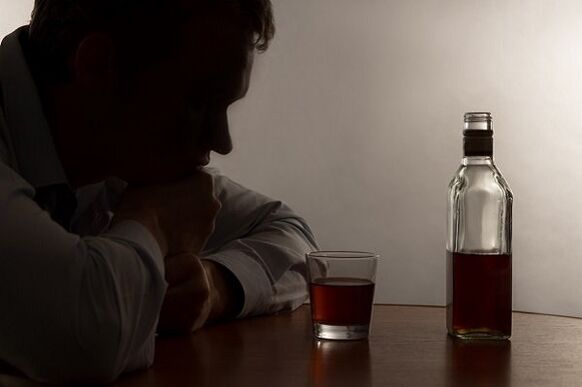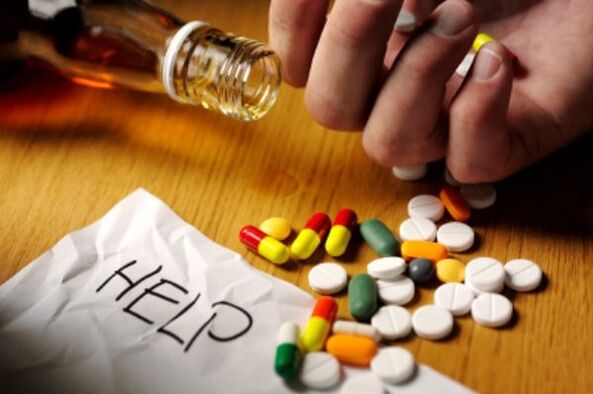Drinkers and their loved ones believe that quitting alcohol suddenly is much better and more correct than giving up a bad habit step by step. Such methods are not equally effective for everyone, and it is questioned how can alcohol be stopped gradually, causing minimal harm to health?
Is it possible to give up alcohol suddenly?
After the sudden decision to quit, drunks often fail, returning to their addiction. Moreover, the dependence on alcohol only became more and more powerful, as the body, which suddenly stopped receiving conventional ethanol, tried to store it for future use.
People who have been drinking for a long time are so used to the effects of alcohol on their bodies that blunt refusal not only gives them discomfort, but also makes them even more attached to the bottle. when broken. In addition, often such attempts to break up with addiction affect the physical and mental state of a person's health, exacerbating it. However, alcoholism is not about wanting to drink, but an addiction that develops on many levels, and abruptly quitting alcohol can lead to disastrous consequences.
Important!You can stop drinking suddenly if your addiction lasts less than a year.

Longtime drinkers will not be able to give up the "green snake" once. Throwing them should be done in stages, and ideally under the supervision of an autobiologist. This is due to the fact that if you sharply reject the habit, chronic illnesses can become exacerbated, mental problems that did not exist before develop. For negative rejection to become a reason to drink again, you need to have the control of your doctor, the support of family and friends, and use the technique of gradual rejection instead of breaking up. Painful addiction is necessary. Tools that are sold freely on the Internet also help in this regard.
What changes will happen in the body
After giving up alcohol for the first time, feelings can be subjectively uncomfortable. This is due to the negative effects of ethanol on the body, as well as the fact that the drunk person has not yet recovered his health.

In the first weeks of the rejection, a person may feel depressed, often get sick, and experience episodes of depression. Such a response is explained by the reduced immunity and the fact that the body has not yet adapted to the new conditions and is trying to get things back to normal. People at this stage tend to get their wine bottles back, believing this is better than being constantly ill.
Important!At first, it is necessary to have people beside the former alcoholic who can provide psychological support for him and explain that his health will return to normal as soon as the body flushes out the toxins.
When the crisis passes and the body recovers, the former drunk person will feel much better and may even notice it. Improvements will show up in:
- increase the body's defenses;
- improve skin condition;
- improve memory;
- Stable in the work of the heart and blood vessels;
- normalize the processes of digestion and urination.
Alcoholics do not have an immediate improvement in their general condition as soon as they stop drinking. It takes time for your body to cope with the addiction. You have to remember this and don't expect quick results.
Alcohol withdrawal syndrome
Drunk people often allude to the fear of quitting alcohol when defending their desire to drink. What is it, and how do I quit drinking so that this unpleasant complication doesn't develop?
Withdrawing is the human body's normal response to the sudden rejection of something. In the case of alcoholism, it manifests primarily in a dangerous condition such as delirium.

Delirium manifests itself in that a few days after refusing to drink, a person loses self-control. In this case, the following symptoms may appear:
- insomnia;
- panic attacks;
- illusion;
- drunk.
In such a psychotic state, a person who has been addicted to alcohol poses serious dangers not only to himself but also to those around him. Symptoms mainly develop in the evening and morning, while the patient is calm during the day and night.
It has been shown that alcohol-induced psychosis develops mainly in drinkers, who have been drinking for a long time and have quit alcohol abruptly.
With the gradual abandonment of harmful products that are regularly consumed, withdrawal syndrome develops very rarely. This is another reason that led to step by step sticking with the "green snake".
Gradual failure is the key to success
If you have been drinking for a long time and cannot imagine yourself without a beer bottle or a glass of vodka, then doctors recommend seeking professional help. The autobiologist, to whom such a patient comes, who realizes that he has a problem, makes recommendations regarding the gradual refusal of alcohol.
Gradually quitting alcohol is the best option for chronically intoxicated people. At the same time, it is possible to combine a variety of treatments for addiction, ranging from medication and ending with psychotherapy sessions.
Gradual failure involves many stages.
- First, one must accept the existence of a problem and be willing to deal with it. This stage is one of the most difficult, as alcoholics often do not consider themselves sick.
- Second, you need to overcome your arrogance and seek medical help. This stage can also be difficult for a person with addiction, as it means admitting that they have weaknesses they have to deal with.
- Third, it will be necessary to start a consistent and slow struggle. To do this, you will have to follow your doctor's recommendations, avoid alcohol, completely change your approach to life.

If a person stops drinking alcohol gradually, they are more likely to quit once and for all. In this case, the body manages to adapt to the changes, remove accumulated toxins, and form new positive habits to replace old negative ones.
Gradually refusing to drink is an option for alcoholics who have gone into a chronic phase, when it is impossible to suddenly quit drinking. With such an approach to parting an addiction, medical advice, positive attitude and perseverance are needed, as well as support from loved ones. The more responsible a person is for their need to quit drinking, the higher the likelihood of success will be.

































